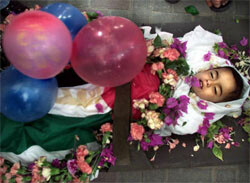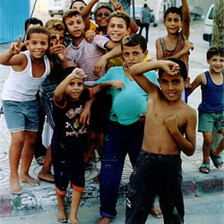Gaza Strip 13 November 2002
(12 November, 2002) Today in Rafah the elderly woman sits in a chair in a narrow dirt alleyway, the same spot she sat in yesterday when she still had a house, uninhabitable though it was from the stench of flooding sewage. In one day her eyes have gone from bright to dull. She is wearing the same clothes. Besides being stateless, she is now homeless.
Israeli tanks ripped through her house yesterday, along with those of over 100 Palestinians. The woman next door holds my hands, kissing my cheeks. She is imploring me to do something to save her damaged home, to stop the Israeli soldiers from shooting at her, to stop the sewage that is seeping through the creases in her cement-block house. She is crying as she leads me through the broken glass, wading through the floor. She points to the tanks and bulldozers just outside her window, and holds her hands up to the sky. The streets are full of flies. The 8 meter high wall that Israel is building out of dirty reddened steel is getting longer everyday.

Flowers and balloons decorate the stretcher carrying the body of two-year-old Palestinian baby Nafez Meshal during his funeral in the Rafah refugee camp in the southern Gaza Strip, November 12, 2002. Reuters/Ahmed Jadallah
Israeli Apache helicopters are shooting missiles at the same building they already destroyed two nights before in Gaza City. This is a reminder to everyone here that they are never safe. In contradiction to international law, Israel continues to practice collective punishment., The Gaza Strip, already like a prison because the people cannot move in or out, is being used as a dumping ground for the family members of “wanted” Palestinians. Many are saying that as soon as Israel banishes all Palestinians to Gaza, it will simply bomb the Strip out of existence.
(13 November 2002) In Rafah this evening, a family was eating its Ramadan breakfast in the one room it had left of its destroyed house. The house had already been partially bulldozed days before, but there was nowhere else for the family to go. An Israeli tank passed by, firing inside. The mother and father grabbed their children and began to run. The father, carrying two of the children, escaped. The mother held her three year-old son, but was injured as she tried to run away from the Israeli tank fire. She was taken to the hospital.
The father found their three year-old son with a heavy machine gun bullet shot by a tank in his chest. A friend who has two young children and another on the way phones me and says, “This is a small body, a three year-old’s body. This bullet is big, it’s for walls, or to fight tank to tank, not for children.” I ask what can anyone do to defend themselves, to resist. He tells me, “We have the choice to die. This is the reality. We can’t escape from this.”
News from the West Bank is that 100 tanks are plowing through Nablus, a city still under curfew. On Al-Jazera television I see a boy in a T-shirt and jeans running behind one of the tanks, trying to insert a Palestinian flag.
Kristen Ess is a political activist and freelance journalist from New York City, who has lived in the West Bank and Gaza since March 2002, where she does solidarity work and reports for Free Speech Radio news and Left Turn magazine.



